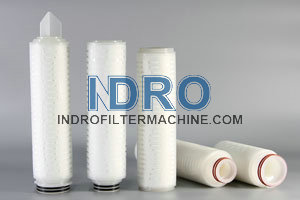
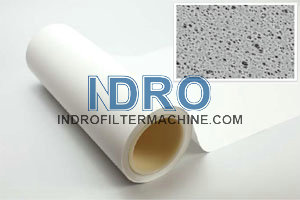
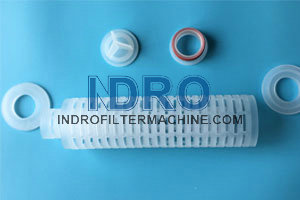 components,
components,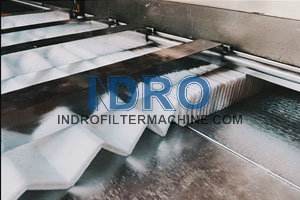 This crucial step is accomplished using a sophisticated pleating machine, designed to meticulously fold the membrane into precise, uniform pleats. The accuracy of the pleating process is paramount, as the uniformity of each pleat directly influences the overall filtration efficiency of the cartridge.
This crucial step is accomplished using a sophisticated pleating machine, designed to meticulously fold the membrane into precise, uniform pleats. The accuracy of the pleating process is paramount, as the uniformity of each pleat directly influences the overall filtration efficiency of the cartridge.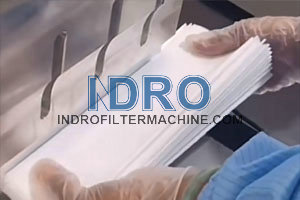 The focus here is on utilizing the filter IR welder to precisely join the pleats at their midpoint. Achieving a strong bond at the middle seam is imperative for maintaining the uniform spacing and alignment of the pleats, which, in turn, impacts the overall filtration efficiency. The welding process must be carried out with careful attention to the machine's settings and the technique used, as optimal welding parameters are key to preventing damage to the PES material while ensuring a durable seam. This process not only solidifies the structure of the pleated material but also prepares it for the subsequent steps in the assembly line, such as installation into the cage and end cap welding. Mastery of the filter IR welder's capabilities and settings during this phase is crucial for producing a high-quality filter cartridge that meets rigorous filtration standards.
The focus here is on utilizing the filter IR welder to precisely join the pleats at their midpoint. Achieving a strong bond at the middle seam is imperative for maintaining the uniform spacing and alignment of the pleats, which, in turn, impacts the overall filtration efficiency. The welding process must be carried out with careful attention to the machine's settings and the technique used, as optimal welding parameters are key to preventing damage to the PES material while ensuring a durable seam. This process not only solidifies the structure of the pleated material but also prepares it for the subsequent steps in the assembly line, such as installation into the cage and end cap welding. Mastery of the filter IR welder's capabilities and settings during this phase is crucial for producing a high-quality filter cartridge that meets rigorous filtration standards.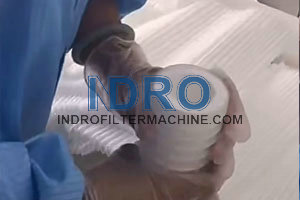 This step is where the structural foundation of the cartridge takes shape. The cage, a critical component for support and durability, is prepared to receive the meticulously pleated PES membrane. It is essential that the insertion of the pleats is executed with precision and care to avoid any misalignment or damage that could compromise the filter's performance. Each pleat must be carefully positioned within the cage, ensuring that the spacing remains consistent and the structural integrity of the pleated pack is maintained. This careful placement is crucial for the overall effectiveness of the filter, as it directly impacts the flow and filtration capabilities. Engaging the pleats with the cage correctly sets the stage for subsequent assembly steps, reinforcing the importance of precision at this juncture in the process.
This step is where the structural foundation of the cartridge takes shape. The cage, a critical component for support and durability, is prepared to receive the meticulously pleated PES membrane. It is essential that the insertion of the pleats is executed with precision and care to avoid any misalignment or damage that could compromise the filter's performance. Each pleat must be carefully positioned within the cage, ensuring that the spacing remains consistent and the structural integrity of the pleated pack is maintained. This careful placement is crucial for the overall effectiveness of the filter, as it directly impacts the flow and filtration capabilities. Engaging the pleats with the cage correctly sets the stage for subsequent assembly steps, reinforcing the importance of precision at this juncture in the process.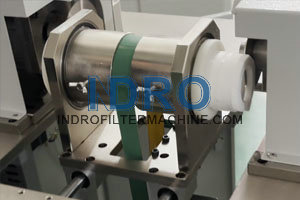 This step is not merely about aesthetics; it plays a crucial role in optimizing the filter's performance. The trimming process ensures that the pleat pack aligns perfectly with the dimensions of the cage, eliminating any overhang that could potentially interfere with the end cap welding process. It's a delicate balance between removing enough material to achieve a snug fit and preserving the structural integrity of the pleated filter cartridge. Precision in trimming is key, as uneven or excessive trimming could jeopardize the uniform flow of liquid through the filter, affecting its efficacy. This process requires a steady hand and a keen eye for detail, as every cut contributes to the overall quality and functionality of the finished product. Engaging in this meticulous trimming sets the stage for the subsequent steps, particularly the end cap welding, ensuring that the components fuse seamlessly, thereby reinforcing the cartridge's structural integrity and operational efficiency.
This step is not merely about aesthetics; it plays a crucial role in optimizing the filter's performance. The trimming process ensures that the pleat pack aligns perfectly with the dimensions of the cage, eliminating any overhang that could potentially interfere with the end cap welding process. It's a delicate balance between removing enough material to achieve a snug fit and preserving the structural integrity of the pleated filter cartridge. Precision in trimming is key, as uneven or excessive trimming could jeopardize the uniform flow of liquid through the filter, affecting its efficacy. This process requires a steady hand and a keen eye for detail, as every cut contributes to the overall quality and functionality of the finished product. Engaging in this meticulous trimming sets the stage for the subsequent steps, particularly the end cap welding, ensuring that the components fuse seamlessly, thereby reinforcing the cartridge's structural integrity and operational efficiency.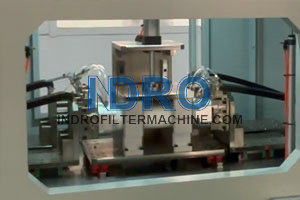 This procedure is centered around the adept use of a filter IR welder, a pivotal tool in ensuring the end caps are securely bonded to the main body of the cartridge. The integrity of the filter relies heavily on this step, as the end caps serve to enclose the filtration system, preventing any bypass of the liquid being filtered. During this phase, the pre-trimmed pleat pack, now perfectly aligned within its cage, receives its end caps — the final components necessary for structural completeness.
This procedure is centered around the adept use of a filter IR welder, a pivotal tool in ensuring the end caps are securely bonded to the main body of the cartridge. The integrity of the filter relies heavily on this step, as the end caps serve to enclose the filtration system, preventing any bypass of the liquid being filtered. During this phase, the pre-trimmed pleat pack, now perfectly aligned within its cage, receives its end caps — the final components necessary for structural completeness.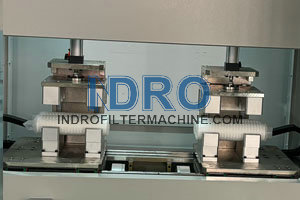 This process hinges on the skilled application of the filter IR welder, which is tasked with creating a durable and seamless bond between the cartridges. The welding of length connectors is a delicate operation that requires precise control over the welder's settings to ensure that the heat applied is sufficient to fuse the connectors without compromising the integrity of the PES material or the structural components of the cartridges.
This process hinges on the skilled application of the filter IR welder, which is tasked with creating a durable and seamless bond between the cartridges. The welding of length connectors is a delicate operation that requires precise control over the welder's settings to ensure that the heat applied is sufficient to fuse the connectors without compromising the integrity of the PES material or the structural components of the cartridges.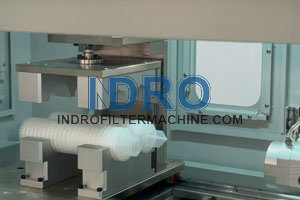 This stage utilizes the sophisticated capabilities of the filter IR welder to form a robust bond between the cartridge and its adaptors or fittings. Precision in this welding process is crucial, as it guarantees a secure, leak-proof connection essential for the filter's optimal performance within the filtration setup. The technician must meticulously adjust the welder's settings to suit the specific materials in use, aiming for a weld that is strong yet does not compromise the structural integrity of the cartridge or its components. Achieving this requires a deep understanding of the welder’s operation and an adept handling of the materials involved. This final welding step not only completes the assembly process but also ensures the filter cartridge is ready for effective deployment in its operational environment, showcasing the importance of precision welding in the production of high-quality PES pleated filter cartridges.
This stage utilizes the sophisticated capabilities of the filter IR welder to form a robust bond between the cartridge and its adaptors or fittings. Precision in this welding process is crucial, as it guarantees a secure, leak-proof connection essential for the filter's optimal performance within the filtration setup. The technician must meticulously adjust the welder's settings to suit the specific materials in use, aiming for a weld that is strong yet does not compromise the structural integrity of the cartridge or its components. Achieving this requires a deep understanding of the welder’s operation and an adept handling of the materials involved. This final welding step not only completes the assembly process but also ensures the filter cartridge is ready for effective deployment in its operational environment, showcasing the importance of precision welding in the production of high-quality PES pleated filter cartridges.